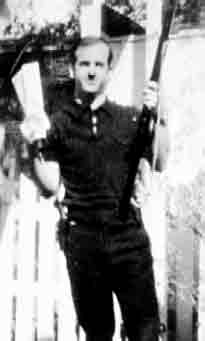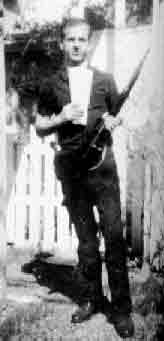Films
Photos
Drawings
Audio Tapes
|
Media Library: Oswald's Rifle Photos
These photos claimed to be taken in the backyard of Oswald's home -
show Oswald holding a rifle in his hands. Many researchers think that these are
assembled photos as Oswald did believe.
Oswald was confronted with the photographs at 6 p.m. on Saturday (November 23,
1963) by Capt. Fritz:
»...He said the picture was not his, that the face was his face, but that this
picture had been made by someone superimposing his face, the other part of the
picture was not him at all and that he had never seen the picture before...[He]
said that he knew all about photography, that he had done a lot of work in
photography himself, that the small picture was a reduced picture of the large
picture, and had been made by some person unknown to him. He further stated that
since he had been photographed here at the City Hall and that people had been
taking his picture while being transferred from my office to the jail door that
someone had been able to get a picture of his face and that with that, they had
made this picture. He told me that he understood photography real well, and that
in time, he would be able to show that it was not his picture, and that it
had been made by someone else.« (1) (Bolds added)
Two major features support this accusation. One is his size. According to
various sources including the autopsy report (2), Oswald was 5 feet 9 inches
(175 cm) tall. The Warren Report states the rifle as 40.2 inches (102 cm) long
(3). Let's add one inch to Oswald's height to account for his shoes - that makes
him 70 inches (178 cm) high in the photographs. The 40.2-inch rifle would then
be 57.4 per cent of Oswald's height.
In the full-page reproduction on the cover of »Life« on February 21, 1964,
Oswald's height measures 12.75 inches (32.4 cm), the rifle 7.75 inches (19.7 cm)
(4). That's 61 %. If the rifle is actually 40.2 inches, the man's height
should be 13.5 inches (34.3 cm) instead of 12.75. Alternatively, the rifle
should be 7.3 inches (18.5 cm) - not 7.75! Thus
- the man in the photograph is only 64 inches (162 cm) - 5 inches (12.7 cm)
shorter than Oswald! - or
- the rifle is actually 42.6 inches (108 cm) long - 2.4 inches (6.1 cm) longer
than the Mannlicher-Carcano.
However, this is not conclusive. It presupposes the absence of distortions in
the photograph. It may not be significant or valid if the picture gives a false
perspective. Much more significant is the failure of the investigators and (FBI)
experts to utilize comparative measurements of that sort in assessing the
authenticity of the photograph.
The second feature of the photograph is the inconsistency in the direction of
the shadows. Commission Exhibit CE 746-A clearly shows the shadow of the man's
body falling behind him and to his right whereas the shadow under his nose
falling in dead center and not to the right. CE 746-C - an enlarged section of
this photograph - confirms this. There, one can see even more clearly a triangle
with the apex at the middle of his upper lip.
The FBI attempted to demonstrate that the rifle was the 40.2-inch Carcano by
having an agent pose with the rifle in the same posture as Oswald and with the
same direction of sunlight. Indeed, in the re-enactment photograph the shadow of
the agent's body falls behind him and to his right as it is in CE 746-A.
Consequently, we should be able to conclude from the shadow under the nose
whether it corresponds to the shadow under Oswald's nose. But the agent's
face and head have been blacked out completely (5). FBI Expert Shaneyfelt
was asked to explain this: »I blanked out the head because it was one of the
employees of the FBI, and I felt it was desirable to blank out the head because
it was not pertinent.« (6)
It should be noted that in a re-enactment photograph taken in the backyard at
the Neely Street address by the Dallas Police, the face of the stand-in has
not been blacked out, although it has no greater pertinence than that of
the FBI agent (7). (In that photograph no attempt was made to duplicate
lightning. Therefore it does not help us in evaluating the original photograph.)
Sources:
(1) - WCR p. 608-609
(2) - CE 1981
(3) - WCR p. 81
(4) - Sylvia Meagher: Accessories after the fact, p. 208.
A
(5) - CE 748
(6) - WCH IV, p. 281
(7) - CE 712
|
Found a Typo?
Click here
|



